Honey from the spa park in Bad Wildbad
You are currently viewing a placeholder content from YouTube. To access the actual content, click the button below. Please note that doing so will share data with third-party providers.
More InformationIt is already possible to sponsor a bee.
Organic beekeeping “The Little Black Forest Beekeeping”
swarm rather than cutting the queens’ wings. An
absolute taboo.
The honey is extracted exclusively from unbrooded honeycombs in the honey chamber. The bees work in an undivided brood chamber. This method is the closest to natural beekeeping. We leave the honey from the brood chamber to the bees. We also avoid ultra-filtration. This removes the typical properties of honey – exactly what makes a natural product. The honeys retain the natural pollen content – which can also be seen in the honeycomb itself.
Keeping Styrofoam / Styrodur hives as bee homes is also not an option. Not only because it is not permitted in organic beekeeping, but because
a natural climate should be created in the bee home. Here, wood is the material that bees have used for millions of years
– in the form of old tree hollows.
These conditions allow the bees to develop in the best possible way.
We would like to emphasize again at this point that due to these – for us elementary – requirements, honeycomb cannot and will not always be available on the breakfast buffet.
Locations of the bees
The careful selection of suitable
locations for the bee colonies is of fundamental importance.
The locations in question must
be considered over the course of an entire bee year. Is
there always enough forage (nectar and pollen) for the bee colonies? Are the areas surrounded by commercially treated agricultural land in the larger area
? Can the beekeepers easily reach the colonies? Are the colonies safe in storms? Do
the hives get enough sun – or too much, etc.
Many other facts need to be clarified regarding the choice of location.
By the way: Have you ever thought about making a small part of your
property, field edge, forest or meadow available to a beekeeper
? Simply speak to the beekeeper in your area about this.
We currently have two locations for our bee colonies in Bad Wildbad: in our beautiful spa park and on the green roof of the Bad Wildbad vocational training center.
About our beekeepers
Behind the many honey bees that do most of the work, there are two beekeepers hidden.
Bea Zotti – completed her training as a bee expert with the LRA in Freiburg in March 2020. In addition, the last lessons to become a specialist advisor for bee products took place in July 2020. In addition to looking after the quails and the medicinal herb garden, harvesting, spinning and bottling honey, clarifying wax and pouring it into candles, making ointments, processing propolis, feeding the bees in late summer, organizing and carrying out the Varroa treatments, painting and repairing beehives with linseed oil, managing colony reproduction, migrating with the bees to the sweet chestnut tree, carrying out swarm checks,… she is currently working part-time in the commercial sector.
“Hello girls, is everything OK with you?” – is a beekeeper with heart and soul.
His top priority is to ensure that the bees are doing well. Through constant
training and webinars, he weighs up whether and how the
desired natural beekeeping can be further optimized. He has also successfully completed training as a bee expert. Axel is also involved in training young beekeepers, always has an open ear for their questions and offers help wherever he can.

